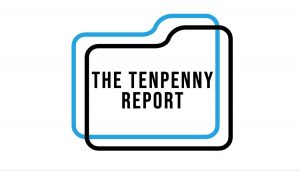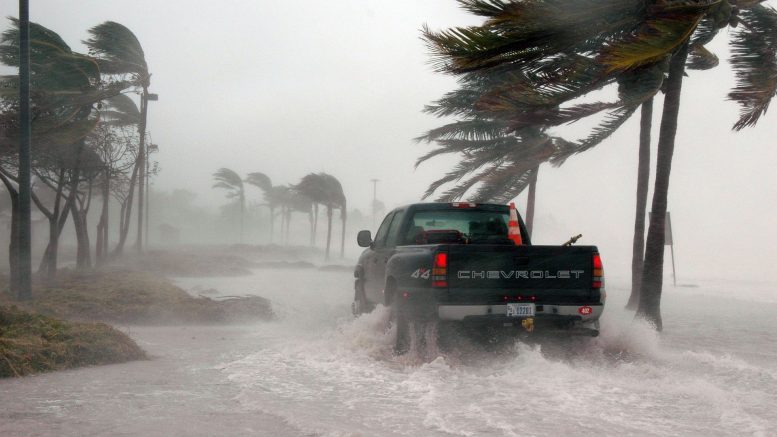The Maui debacle and blatant land grab has forever changed the way Americans view natural disasters. In addition to the usual preparation ahead of the storm, residents now have to wonder whether our own government has nefarious intentions.
Depending on the region of the United States that you live in, you likely have learned to prepare for natural disasters endemic to your area. Californians prepare for mudslides and fires, Tornado Alley states prepare for tornadoes, and islanders know what to do in the event of a tsunami. If you’ve lived on any US coast for any amount of time, you’ve likely experienced a hurricane and know how to prepare for it.
As expected during a storm of Idalia’s magnitude, this region of Florida experienced downed power lines, overturned cars, ripped-off roofs and damaged trees. Floridians know hurricanes and how to deal with these expected issues. What residents didn’t expect were some of the other strange events in the lead up to the storm. This definitely happened in Maui, with the water cutoff, blocked roads and more. It seems to be happening in Florida, too. The Tenpenny Report (TTR) has obtained eyewitness reports of strange events prior to the arrival of Hurricane Idalia.
Land Grab
No one had to worry about possible land grabs before Maui. Now it is a question in the back of everyone’s mind. On Tuesday, Pinellas County Zone A residents were under mandatory evacuation orders. Many chose not to leave, fearing they would not be able to quickly get back to their properties. Around 8am Wednesday morning August 30, Hurricane Idalia made landfall near Florida’s Keaton Beach, a remote area on the western coast, situated about halfway between Tallahassee and Tampa.
The beach town of 13,000 people is in Taylor County, in the center of the Big Bend region. Known as “Nature’s Coast”, it is one of the state’s most rural regions with industries like fishing and forestry. Unlike the busy tourist areas like Orlando and Miami, this part of Florida has millions of acres of undeveloped land.
Idalia certainly packed a punch as a strong category 3 hurricane with 125-mile-per-hour maximum sustained winds. Sadly, the storm flooded areas of the state still recovering from 2022’s Hurricane Ian which left a death toll of 149 people and devastated areas like Fort Myers, Cape Coral and Sanibel Island, due south of where Idalia hit. Governor Ron DeSantis described Ian as a “500-year flood event.”
On Thursday morning, before the rain had even stopped, leftist media outlets were already reporting Idalia as the costliest climate disaster of 2023, with preliminary estimates of over $9 billion in damage. Idalia was proclaimed the 16th climate disaster in the US this year, joining a list of floods, wildfires, excessive heat and other storms.
People worldwide believe the climate narrative to be a reason to develop areas into “smart” 15-minute cities. We reported on these cities earlier this year here. Many local city and county governments are participating in smart city conferences. Maui officials sure did, and several Florida cities like Coral Gables (near Miami), Orlando, Fort Lauderdale and St. Petersburg did too.
These conferences make smart cities sound convenient and even glamorous, but they are modeled after Chinese 15-minute cities in which each neighborhood zone (think Hunger Games districts) is separated by fencing topped with barbed wire. Sounds glamorous already. There are four gates per zone and to leave their zone, Chinese citizens must present a Covid passport QR code and a face scan.
Freedom to Move About
Given the reality of the Chinese smart cities and the smart city plans for Florida, residents naturally become jumpy before Idalia when things happened to restrict their movements. On Saturday August 26, Florida’s Department of Agriculture and Consumer Services (FDACS) reported a fuel contamination issue in ~30 gas stations that received fuel from the Port of Tampa. Diesel fuel was accidentally (due to human error) put in tanks that held regular gas. Residents were advised that any fuel purchased after Saturday morning had the possibility of being contaminated with diesel fuel, therefore impacting the ability to evacuate by car.
TTR has received reports of numerous electric vehicles (EV) stranded in Florida. The salt air and salt water corrode the batteries and the cars won’t work and won’t recharge. On Tuesday, Pinellas county officials barricaded roads in and out of the county until further notice. A woman said that residents were free to move about Pinellas County but that they could not cross over into Hillsborough County or into any point east or south of St. Petersburg. The US Postal Service suspended all services until further notice. Significant flooding began late Tuesday evening with large amounts of forecasted rain for the next 48 hours.
FEMA and Emergency Services
In the storm aftermath, mainstream media wasted no time blaming Idalia on man made climate change, but we hear little to nothing about the local rescue and recovery efforts in areas like Steinhatchee, Florida, 20 miles south of the Idalia landfall. Steinhatchee is a rural area of about 500 residents and one that was devastated by the storm surge.
News reports note that county and state officials, rescue crews and 5,500 National Guardsman are on the scene. These crews are checking on power lines, bridges and infrastructure, and clearing debris and toppled trees. They’re also looking for anyone in distress but are saying things like this: “Because of the remoteness of the Big Bend area, search teams may need more time to complete their work compared with past hurricanes in more urban areas.” This is a statement from Kevin Guthrie, director of the Florida Department of Emergency Management. With 5,500 soldiers, why would this be a slow effort?
Interestingly, there is no real mention of FEMA yet in the press. Is it because they’re not there? Joe Biden vowed to stay with Florida every step of the way, even as he remained “laser focused” (his words) on the devastation in Maui. Biden told FEMA director Deanne Criswell to spend Thursday in Florida with Governor DeSantis to assess the hurricane damage.
Since storms like Idalia can be predicted, FEMA should be poised ahead of the storm, but often they are not. Maybe they were for Idalia. FEMA drew sharp criticism during 2017’s Hurricane Harvey for not being poised in areas ahead of the storm. Local grocers and churches were correctly poised, and in many cases outperformed FEMA. Companies from out of state brought food and large cooking crews in ahead of the storm to cook thousands of meals for a week or two; they did a better job than FEMA as well. In Maui, FEMA is finally providing $700 to each family, while their own officials stay in $1,000 per night hotels. Some news outlets checked and the cheaper $250 hotels were vacant – no FEMA officials and more importantly, no rooms were rented out for RESIDENTS to stay.
If the FEMA response in Florida is anywhere near like that in Maui, Floridians are pretty much on their own. Hopefully, FEMA will do a better job in Florida.
The Aftermath
Time will tell about the government’s response and true intentions. As Idalia left Florida, it crossed into Georgia and weakened Wednesday evening to a tropical storm as it moved closer to the Charleston, South Carolina area.
Florida residents are in cleanup phase Thursday morning. Now the damage can truly be assessed. Pinellas County officials are reopening facilities and bridges to the barrier islands and they have lifted the mandatory evacuation order. With 5,500 guardsmen on the ground and FEMA plans with the governor, Florida should be back in shape in no time.
The Maui fire changed the context of these disasters. We now question things we would never have thought of questioning. We’ve never questioned the intentions of the government, but after Maui, we do. We’ve never even thought of land grabs, but after Maui we do. We don’t question that Florida gets hurricanes, but when the National Weather Service in Tallahassee calls Idalia “an unprecedented event” because no major hurricanes on record have ever passed through the Keaton Beach and Big Bend area, we pay closer attention. Hurricane Hilary also hit an area of California that had never been hit before.
We’ve always thought of these disasters as isolated events, but when we read about 15-minute cities and Miami’s planned elimination of meat and dairy consumption by 2030, we question whether these disasters are one cog in the wheel of a more sinister plan. (Miami is one of 14 major American cities that have this goal; they are part of the globalist climate organization C40 Cities Climate Leadership Group. They also want to limit your purchases to three new clothing items per year, no personal vehicles and one flight every three years.)
Americans have a tendency to compare storms. We compare big hurricanes like Harvey, Katrina and Ian to each other regarding category strength, storm surge, property damage and loss of life. We compare the Maui Fires to Canada and California fires, like this podcast from Deborah Tavares who compares the eerie similarities among the 2017 Tubbs Fire, the 2018 Camp Fire, the 2021 Paradise Valley California Fire and Maui. Americans have rarely cross-compared different natural disasters, like the Maui Fire compared to Hurricanes Hilary and Idalia. Maybe it’s time to start doing that, since these disasters have now taken on a whole new context. Keep your eyes and ears open. Pay attention; Agenda 2030 is being implemented right before our eyes. Question everything and share articles like these with everyone you know.
++++++++++++++++++++++++++++++++
 Like what you’re reading on The Tenpenny Report? Share this article with your friends. Help us grow.
Like what you’re reading on The Tenpenny Report? Share this article with your friends. Help us grow.
Get more of Dr. Tenpenny’s voice of reason at her website.
Join our list here
++++++++++++++++++++++++++++++++
 Fed Up Texas Chick is a contributing writer for The Tenpenny Report. She’s a rocket scientist turned writer, having worked in the space program for many years. She is a seasoned medical writer and researcher who is fighting for medical freedom for all of us through her work.
Fed Up Texas Chick is a contributing writer for The Tenpenny Report. She’s a rocket scientist turned writer, having worked in the space program for many years. She is a seasoned medical writer and researcher who is fighting for medical freedom for all of us through her work.

